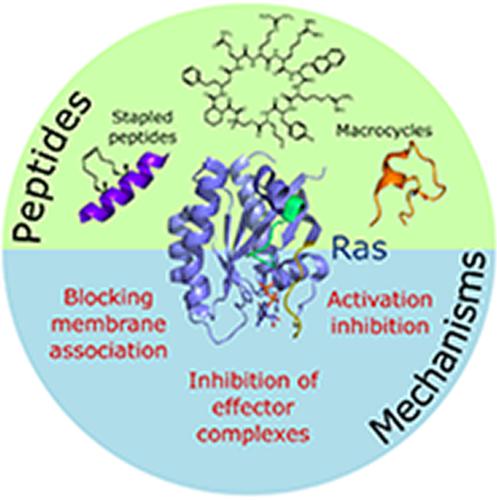当前位置:
X-MOL 学术
›
Pept. Sci.
›
论文详情
Our official English website, www.x-mol.net, welcomes your
feedback! (Note: you will need to create a separate account there.)
Therapeutic peptides targeting the Ras superfamily
Peptide Science ( IF 1.5 ) Pub Date : 2020-04-13 , DOI: 10.1002/pep2.24165 Catherine A. Hurd 1 , Helen R. Mott 1 , Darerca Owen 1
Peptide Science ( IF 1.5 ) Pub Date : 2020-04-13 , DOI: 10.1002/pep2.24165 Catherine A. Hurd 1 , Helen R. Mott 1 , Darerca Owen 1
Affiliation

|
The Ras superfamily of small GTPases are master regulators of numerous essential processes within the cell, so that when they malfunction, cancer and many other diseases can result. For example, activating Ras mutations are present in approximately 20% of human cancers. As such, they are key therapeutic targets, yet more than three decades of intensive research efforts have failed to produce effective Ras inhibitors in the clinic. This is, in part, due to their relatively smooth surfaces which are difficult to target through traditional drug discovery methods using small molecules. Peptides offer a solution to this issue as they occupy larger surface areas on their targets and therefore offer exquisite selectivity and affinity. However, their use in the past has been limited to extracellular targets due to delivery issues. Recent advances in peptide macrocyclisation, modifications and delivery methods have ignited increased interest in the use of these highly effective biologics for intracellular targets. This review will cover progress made in the development of peptides targeting small GTPases to treat a wide range of diseases.
中文翻译:

靶向Ras超家族的治疗性肽
小型GTP酶的Ras超家族是细胞内许多基本过程的主要调节剂,因此当它们失灵时,会导致癌症和许多其他疾病。例如,激活的Ras突变存在于大约20%的人类癌症中。因此,它们是关键的治疗靶标,但是超过三十年的深入研究未能在临床上产生有效的Ras抑制剂。部分原因是由于它们的相对光滑的表面难以通过使用小分子的传统药物发现方法来靶向。肽为解决这一问题提供了解决方案,因为它们在靶标上占据较大的表面积,因此具有出色的选择性和亲和力。但是,由于传递问题,它们在过去的使用仅限于细胞外靶标。肽大环化,修饰和递送方法的最新进展已激发了人们对将这些高效生物制剂用于细胞内靶标的兴趣。这篇综述将涵盖针对小型GTPase的多肽的研发进展,以治疗多种疾病。
更新日期:2020-04-13
中文翻译:

靶向Ras超家族的治疗性肽
小型GTP酶的Ras超家族是细胞内许多基本过程的主要调节剂,因此当它们失灵时,会导致癌症和许多其他疾病。例如,激活的Ras突变存在于大约20%的人类癌症中。因此,它们是关键的治疗靶标,但是超过三十年的深入研究未能在临床上产生有效的Ras抑制剂。部分原因是由于它们的相对光滑的表面难以通过使用小分子的传统药物发现方法来靶向。肽为解决这一问题提供了解决方案,因为它们在靶标上占据较大的表面积,因此具有出色的选择性和亲和力。但是,由于传递问题,它们在过去的使用仅限于细胞外靶标。肽大环化,修饰和递送方法的最新进展已激发了人们对将这些高效生物制剂用于细胞内靶标的兴趣。这篇综述将涵盖针对小型GTPase的多肽的研发进展,以治疗多种疾病。































 京公网安备 11010802027423号
京公网安备 11010802027423号